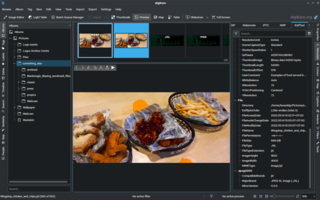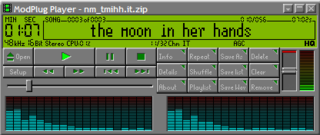Related Research Articles

MP3 is a coding format for digital audio developed largely by the Fraunhofer Society in Germany, with support from other digital scientists in the United States and elsewhere. Originally defined as the third audio format of the MPEG-1 standard, it was retained and further extended — defining additional bit-rates and support for more audio channels — as the third audio format of the subsequent MPEG-2 standard. A third version, known as MPEG 2.5 — extended to better support lower bit rates — is commonly implemented, but is not a recognized standard.

Synchronized Multimedia Integration Language ) is a World Wide Web Consortium recommended Extensible Markup Language (XML) markup language to describe multimedia presentations. It defines markup for timing, layout, animations, visual transitions, and media embedding, among other things. SMIL allows presenting media items such as text, images, video, audio, links to other SMIL presentations, and files from multiple web servers. SMIL markup is written in XML, and has similarities to HTML.

Vorbis is a free and open-source software project headed by the Xiph.Org Foundation. The project produces an audio coding format and software reference encoder/decoder (codec) for lossy audio compression. Vorbis is most commonly used in conjunction with the Ogg container format and it is therefore often referred to as Ogg Vorbis.
Waveform Audio File Format is an audio file format standard, developed by IBM and Microsoft, for storing an audio bitstream on PCs. It is the main format used on Microsoft Windows systems for uncompressed audio. The usual bitstream encoding is the linear pulse-code modulation (LPCM) format.
Windows Media Audio (WMA) is a series of audio codecs and their corresponding audio coding formats developed by Microsoft. It is a proprietary technology that forms part of the Windows Media framework. WMA consists of four distinct codecs. The original WMA codec, known simply as WMA, was conceived as a competitor to the popular MP3 and RealAudio codecs. WMA Pro, a newer and more advanced codec, supports multichannel and high resolution audio. A lossless codec, WMA Lossless, compresses audio data without loss of audio fidelity. WMA Voice, targeted at voice content, applies compression using a range of low bit rates. Microsoft has also developed a digital container format called Advanced Systems Format to store audio encoded by WMA.
A music tracker is a type of music sequencer software for creating music. The music is represented as discrete musical notes positioned in several channels at discrete chronological positions on a vertical timeline. A music tracker's user interface is usually number based. Notes, parameter changes, effects and other commands are entered with the keyboard into a grid of fixed time slots as codes consisting of letters, numbers and hexadecimal digits. Separate patterns have independent timelines; a complete song consists of a master list of repeated patterns.
Advanced Audio Coding (AAC) is an audio coding standard for lossy digital audio compression. Designed to be the successor of the MP3 format, AAC generally achieves higher sound quality than MP3 encoders at the same bit rate.
XM, standing for "extended module", is an audio file type introduced by Triton's FastTracker 2. XM introduced multisampling-capable instruments with volume and panning envelopes, sample looping and basic pattern compression. It also expanded the available effect commands and channels, added 16-bit sample support, and offered an alternative frequency table for portamentos.

OpenMPT is an open-source audio module tracker for Windows. It was previously called ModPlug Tracker, and was first released by Olivier Lapicque in September 1997.
FastTracker 2 is a music tracker created by Fredrik "Mr. H" Huss and Magnus "Vogue" Högdahl, two members of the demogroup Triton which set about releasing their own tracker after breaking into the scene in 1992 and winning several demo competitions. The source code of FastTracker 2 is written in Pascal using Borland Pascal 7 and TASM. The program works natively under MS-DOS.
MOD is a computer file format used primarily to represent music, and was the first module file format. MOD files use the “.MOD” file extension, except on the Amiga which doesn't rely on filename extensions; instead, it reads a file's header to determine filetype. A MOD file contains a set of instruments in the form of samples, a number of patterns indicating how and when the samples are to be played, and a list of what patterns to play in what order.

Module file is a family of music file formats originating from the MOD file format on Amiga systems used in the late 1980s. Those who produce these files and listen to them form the worldwide MOD scene, a part of the demoscene subculture.

Rockbox is a free and open-source software replacement for the OEM firmware in various forms of digital audio players (DAPs) with an original kernel. It offers an alternative to the player's operating system, in many cases without removing the original firmware, which provides a plug-in architecture for adding various enhancements and functions. Enhancements include personal digital assistant (PDA) functions, applications, utilities, and games. Rockbox can also retrofit video playback functions on players first released in mid-2000. Rockbox includes a voice-driven user-interface suitable for operation by visually impaired users.
TwinVQ is an audio compression technique developed by Nippon Telegraph and Telephone Corporation (NTT) Human Interface Laboratories in 1994. The compression technique has been used in both standardized and proprietary designs.

A tag editor is a piece of software that supports editing metadata of multimedia file formats, rather than the actual file content. These are mainly taggers for common audio tagging formats like ID3, APE, and Vorbis comments, but can also be taggers for JPEG, PDF and TIFF metadata.
S3M is a module file format, the successor to the STM format used by the original Scream Tracker. Both formats are based on the original MOD format used on the Commodore Amiga computer.
Impulse Tracker is a multi-track music tracker. Originally released in 1995 by Jeffrey Lim as freeware with commercial extensions, it was one of the last tracker programs for the DOS platform.

ModPlug Player is a module file player developed by Olivier Lapicque in conjunction with the original ModPlug Tracker project and the ModPlug Browser plugin. Features include a playlist editor, graphical equalizer, automatic gain control, bass expansion, reverb, Dolby Surround Sound support and the ability to mix two modules simultaneously and to change their pitch and tempo. The player supports a variety of module music files in both native and compressed formats.
XMPlay is a freeware audio player for Windows. Initially released in 1998, it is often used as a reference player for tracker audio files.